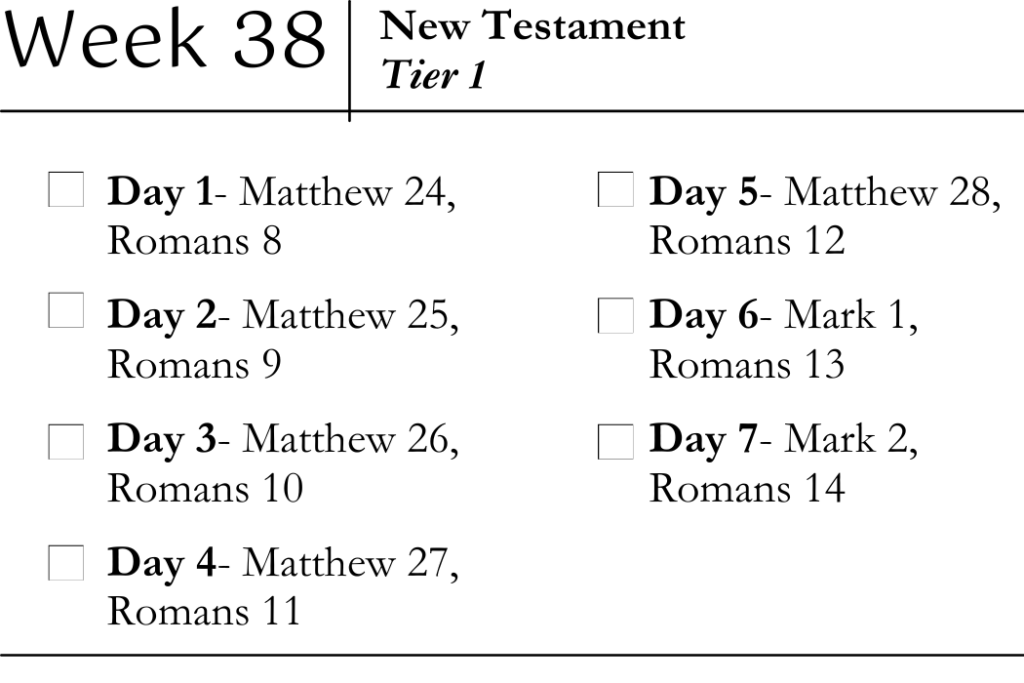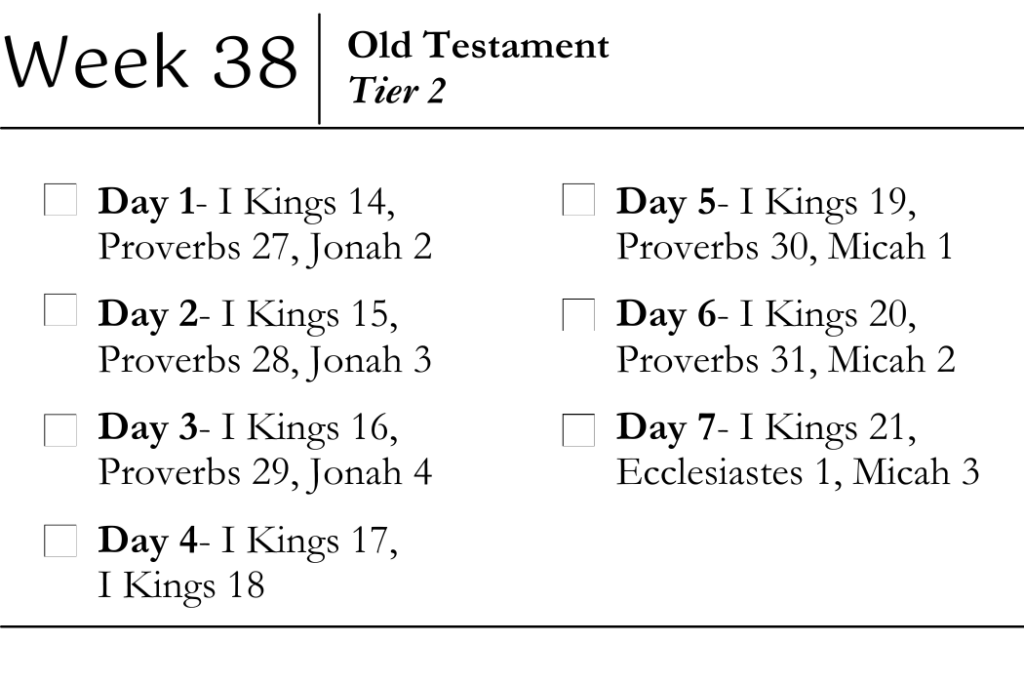We are transformed by the renewing of our minds.
This week, we finish Matthew and enter Mark while we continue in Romans. 1 Kings picks up the pace: kings come and go, both in Judah and Israel, Elijah’s confrontation with the prophets of Baal, Jezebel’s threat, and Naboth being murdered by the plot of Jezebel to make room for a vegetable garden for Ahab.
We finish Proverbs with the Proverbs 31 woman, who is an end-time picture of the matured church on the earth. From there we enter Ecclesiastes. We finish Jonah and the story of the prophet.
WATCH That I May Know Him Week 38 PODCAST

GOSPELS
Matthew 24 – 28
We begin with Jesus’ “Olivet discourse,” after His disciples pointed out the glorious temple as they left and ascended the Mount of Olives. From there, you have a complete view of Temple Mount and from there Jesus told them of “His coming and the end of the age.” He then makes personal our response with four parables, which I call “End Time Parables.” Chapter 26 begins with the plot to kill Jesus, followed by the Passover supper, prayer in the Garden of Gethsemane, Jesus’ arrest, and Peter’s denial. Then it’s off to Pontius Pilate and Jesus is crucified, mocked as the Father pours out His wrath upon His perfect sacrifice during three hours of complete darkness over all the earth. The resurrection begins with Jesus’ first words to the women who came to His tomb, “Rejoice!”. We then see Jesus in Galilee, as He gives the great commission to His eleven disciples.
Mark 1 – 2
Mark begins with an introduction of John the Baptist and Jesus being baptized by him, followed by a reference to His wilderness testing. The rest of Chapter 1 is dedicated to a day in the ministry of Jesus beginning with calling His disciples, then ministry in Capernaum (which begins on the Sabbath in the Synagogue), lunch at Peter’s house, an evening of healing and deliverance, followed by Jesus rising early to seek the Father in prayer. This is the secret to Jesus’ ministry of power: His prayer life. In Chapter 2, Jesus forgives and heals a paralytic, calls Matthew the tax collector to follow Him, and addresses accusations from the Pharisees.
EPISTLES
Romans 8 – 14
Romans 8 is my favorite chapter in Romans because, after seven chapters explaining the gospel of God in action (faith versus law), Paul gives us a practical path to sanctification and into Jesus’ glorification. Nothing we have done, all that the Father has done, and all of it is ours as we accept the testimony of His Son and our active faith in maturing. Chapters 9 through 11 address the promises to Israel, their hardness of heart, and God’s faithfulness to fulfill His promises, as we are all saved by grace through faith, unto such humility and gratitude for our being grafted into the Olive Tree.
Romans 12 gives a call to transformation by the renewing of our mind, giving us a list of “new thoughts” regarding all relationships. Chapter 13 is our call to submit to governing authority for conscience’s sake as love is the fulfillment of the law. Put on the armor of light as we put on the Lord Jesus Christ. Chapter 14 is a masterful contrasting of each servant of God to walk in faith and humility, not judgment of each other’s faith-expression, because conscience is not to be forced but valued; for God is able to make all His servants stand and each of us will give an account of ourselves at Christ’s judgment seat. Love wins again.

HISTORY
1 Kings 14 – 21
Jeroboam is judged for his sin of the two golden calves that he erected to keep Israel from going to Jerusalem during the feasts for fear they would return to Judah. Jeroboam created a new religion, new priesthood, and new feasts to control and keep Israel from the Lord. This was the sin of the house of Jeroboam. In Chapter 14, he discovers his fate and God’s reason for it. In Chapters 15 and 16, we witness five kings over Israel leading to the sixth Ahab. Here we see the eternal truth declared in Proverbs 28:2, “Through the transgression of a land, many are its princes; but by a man of understanding and knowledge, right will be prolonged.” In Judah, we have Asa, a good king. Together we will see that Israel never has a good king, and Judah has a few wicked kings. It’s easy to see because when they are introduced in the chapter, the narrative gives God’s judgment over them—with Asa, as well as Nadab, and all other kings: “Asa did what was right in the eyes of the Lord, as did his father David” (1 Kings 15:10); “Now…Nadab did evil in the sight of the Lord and walked in the way of his father, and in his sin by which he made Israel sin” (1 King 15:25, 26).
In Chapter 17, we witness the ministry of the prophet Elijah, as he proclaims a drought, then a challenge to the prophets of Baal, intercession again for rain, and expected national repentance. But Elijah is confronted and undone by the words of Jezebel sent by a messenger, “‘So let the gods do to me, and more also, if I do not make your life as the life of one of them by tomorrow about this time.’ And when he (Elijah) saw that, he arose and ran for his life…” (1 Kings 19:2, 3).
There are so many timeless truths in these five chapters from 17 to 21 as we witness the Lord using a man, the exhaustion Elijah falls into, his fear, his running, remorse, and his own conclusions that, “I have been very zealous for the Lord God of hosts; because the children of Israel have forsaken Your covenant, torn down Your altars, and killed Your prophets with the sword. I alone am left, and they seek to take my life” (1 Kings 19: 10, 14).
POETRY
Proverbs 27 -31
We are finishing Proverbs with timeless wisdom, “Do not boast about tomorrow, for you do not know what a day may bring forth” (Proverbs 27:1); “The wicked flee when no one pursues, but the righteous are bold as a lion” (Proverbs 28:1); “He who is often rebuked, and hardens his neck will suddenly be destroyed, and that without remedy” (Proverbs 29:1).
The last two chapters (Chapters 30 and 31) are the proverbs of Agur, and of Lemuel (with utterances his mother taught him. Here we are given the description of the “Proverbs 31 Woman”: “Many daughters have done well, but you excel them all” (Proverbs 31:29). Several years ago the Lord spoke to Cammy, my wife, to look at Proverbs 31 as the end time description of the Bride of Christ. A powerful revelation that includes all believers as we are conformed into the image of Christ.
Ecclesiastes 1
Solomon writes this book having expended himself in the attaining of wisdom, then giving himself to know madness and folly. From here all life is seen as vanity. These are both timeless truths that will sober our lives and good advice to honor God and be thankful to Him in all things.
PROPHETS
Jonah 2 – 4
This book is more about Jonah the prophet and his heart than of Nineveh the capital of Assyria. Jonah does not want Nineveh to repent, and he flees from the presence of the Lord. He is caught in a storm and then thrown overboard where the Lord has prepared a great fish to swallow Jonah. After three days and three nights in the fish’s belly, Jonah finally prays. His prayer shows the power of repentance from unbelief, which is the root of all rebellion against God (Hebrews 3, 4). “Those who regard worthless idols forsake their own Mercy, but I will sacrifice to You with the voice of thanksgiving; I will pray what I have vowed. Salvation is of the Lord.” (Jonah 2:8, 9) “So, the Lord spoke to the fish, and it vomited Jonah onto dry land” (Jonah 2:10).
It’s off to Nineveh, as God’s command has not changed: “Arise, go to Nineveh, that great city, and preach to it the message that I tell you” (Jonah 1:2; 3:2). Nineveh repents in sackcloth and ashes and the Lord relents of the disaster he said He would bring because He saw their works, that they had turned from their evil way. But Jonah is not happy and becomes angry with the Lord because he knew this would happen. “Ah, Lord, was not this what I said when I was still in my country? Therefore, I fled previously to Tarshish; for I know that You are a gracious and merciful God, slow to anger and abundant in lovingkindness, One who relents from doing harm.” (Jonah 4:2)
God helps Jonah get it, with a kind act and the sudden death of a plant brought up as shade for Jonah. Jonah again tells on himself and his self-righteousness: “Then God said to Jonah, ‘Is it right for you to be angry about the plant?’ And he said, ‘It is right for me to be angry, even to death!’ But the Lord said, ‘You have pity on the plant for which you have not labored, nor made it grow, which came up in a night and perished in a night. And should I not pity Nineveh, that great city, in which are more than one hundred and twenty thousand persons who cannot discern their right hand and their left—and much livestock?’” (Jonah 4:9-11).
Micah 1 – 3
Micah was a prophet during the reign of Hotham, Ahaz, and Hezekiah, kings of Judah. He calls Samaria (the capital of Israel) and Jerusalem (the capital of Judah) on their sins and cover-ups. He calls their evildoing and their false prophets of comfort into the light while promising the Lord’s future restoration. Micah is a book of hope that is found in truth, and in confronting deception. Read to hear the Lord’s conviction and His comfort, as we submit to the King of Righteousness.

